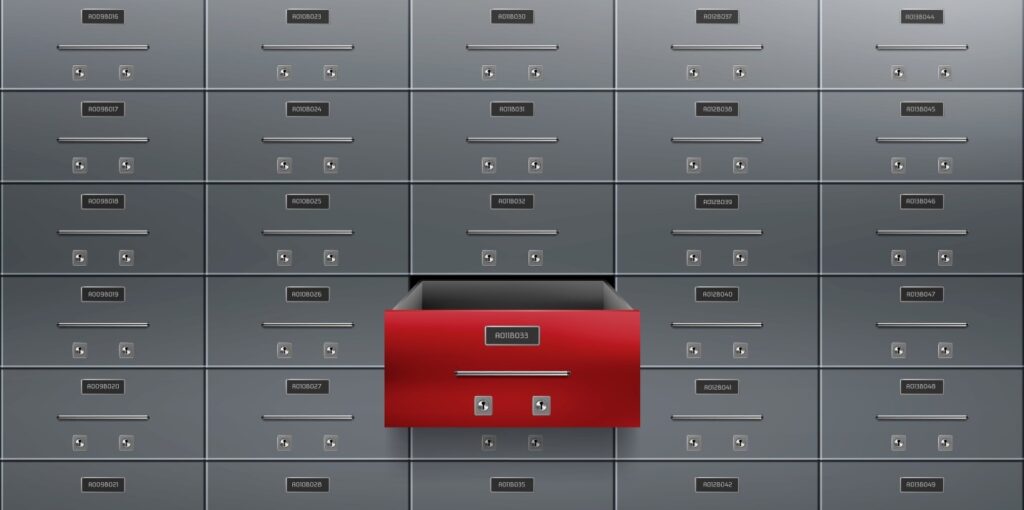
Estate planning is a crucial process for ensuring that your wishes are honored after your death, and a well-crafted will is a central component of this planning. One of the most important considerations when creating a will is deciding where to store it. Many people think, and this is unfortunately, commonly advised, that a safe deposit box is the safest place to store their will, but this choice can lead to significant complications. While it might seem logical to store such a critical document in a secure location, there are several reasons why a safe deposit box may not be the best option. Read on to learn about the potential pitfalls of storing your will in a safe deposit box.
Access Issues After Death
The most significant issue with storing your will in a safe deposit box is that it may be difficult or impossible for your loved ones to access the box after your death. Safe deposit boxes are highly secure, and access is often limited to the person whose name is on the lease or a designated joint owner. If the will is the only document outlining who has the legal right to access the box, your family may find themselves in a catch-22 situation: they need the will to prove their right to access the box, but the will is locked inside the box.
In many jurisdictions, financial institutions require a court order or a probate process to open a safe deposit box if the owner has passed away. This process can be time-consuming, costly, and stressful for your loved ones, delaying the distribution of your estate and creating unnecessary complications during an already difficult time. The longer it takes to access the will, the greater the risk of disputes among heirs or beneficiaries, which could lead to legal battles.
Legal Requirements for Accessing Safe Deposit Boxes Post-Death
In addition to the general access issues, it’s important to understand the specific legal requirements that vary by jurisdiction. Some states or countries may require the appointment of an executor before access to the safe deposit box is granted. Others may demand a court order or other legal documentation, which can further complicate and delay the process. Knowing these requirements and how they apply to your situation is crucial, as they can significantly impact how quickly and smoothly your estate is administered.
Probate Complications
If your will is stored in a safe deposit box, it might complicate the probate process. Probate is the legal process by which a deceased person’s estate is administered, and the will is a critical document in this process. If the will is not readily accessible, it can delay the initiation of probate, leading to prolonged administration of the estate.
In some cases, if the will cannot be located in a timely manner, the court might proceed as if there is no will at all, which means your estate could be distributed according to intestate succession laws set by your state rather than your wishes. This scenario can result in your assets being distributed in a way that you did not intend, potentially excluding loved ones or charities you wanted to benefit.
Joint Ownership Risks
To avoid the access issues mentioned above, some people add a joint owner to their safe deposit box, such as a spouse, adult child, or trusted friend. While this might seem like a solution, it can introduce its own set of risks and complications.
Joint ownership of a safe deposit box gives the co-owner unrestricted access to the contents of the box, including your will and any other valuables or important documents stored inside. This level of access could lead to unintended consequences, such as the co-owner removing or altering the contents without your knowledge or consent.
Furthermore, if the relationship with the joint owner changes over time, such as through a falling out or divorce, you may find yourself in a situation where someone you no longer trust has access to your most important documents. In the worst-case scenario, the co-owner could even destroy or tamper with the will, potentially leading to significant legal challenges and disputes among your heirs.
Potential for Document Obsolescence
Storing a will in a safe deposit box could lead to the document becoming outdated if it is not regularly reviewed and updated. This can be more challenging if the will is not easily accessible, leading to issues if the will does not reflect your most current wishes. Regular updates are essential in estate planning, and a safe deposit box may hinder this process.
Lost or Forgotten Key
A more mundane but still significant issue is the possibility of losing or forgetting the key to the safe deposit box. If you are the only person who knows where the key is or if the key is lost entirely, accessing the contents of the box could become a major hassle. Safe deposit boxes are designed to be secure, and drilling the box to retrieve the contents without a key is a complicated and expensive process that often requires authorization from the financial institution and, in some cases, a court order.
Additionally, if you forget to inform your executor or trusted family members about the existence of the safe deposit box or where the key is kept, they may not even know where to begin looking for your will. This scenario could result in the will being effectively lost, and your estate could be distributed according to state intestacy laws rather than your wishes.
Limitations on Access During Disability
Another potential issue arises if you become incapacitated or disabled and are unable to manage your affairs. If your will is stored in a safe deposit box and no one else has authorized access, your loved ones may face significant challenges in obtaining the will or other important documents needed to manage your affairs.
While a durable power of attorney might grant someone the authority to access the safe deposit box during your lifetime, there are still potential complications. Some financial institutions are hesitant to honor a power of attorney for accessing a safe deposit box, especially if it is an older document or if there are concerns about fraud. This can lead to delays in managing your estate or ensuring that your wishes are followed if you are unable to communicate them yourself.
Security Isn’t Always Guaranteed
Although safe deposit boxes are generally secure, they are not infallible. Natural disasters, such as floods, fires, or earthquakes, could potentially damage or destroy the contents of a safe deposit box. While financial institutions often have security measures in place to protect against such events, there is no guarantee that your will would survive intact.
Moreover, there have been rare but documented cases of theft or loss involving safe deposit boxes. If your will is stolen or lost, it may be difficult or impossible to replace, especially if you did not keep a copy or inform anyone about its existence.
Communication Is Key
No matter where you choose to store your will, it is crucial to inform your trusted individuals, such as your executor or family members, about its location. If they are unaware of where your will is stored, they may not be able to access it when needed, leading to the very complications you are trying to avoid. Regular communication and updates are essential to ensure that your estate plan is executed according to your wishes.
Better Alternatives for Storing Your Will
Given the potential issues associated with storing your will in a safe deposit box, it is wise to consider alternative storage options. Here are a few alternatives that provide better access while still offering security:
- Online Document Storage through Gentreo: Gentreo, www.gentreo.com, offers secure, cloud-based storage for important documents, including wills. Gentreo allows you to designate access rights to specific individuals. You can learn more here: https://www.gentreo.com/family-digital-vault.
- Home Safe: A fireproof and waterproof safe in your home can be a secure place to store your will. Make sure someone you trust knows the combination or where to find the key, or else many of the same problems with a safe deposit box might happen in this case as well.
- Executor or Trusted Individual: Give a copy of your will to your executor or a trusted family member, friend, or attorney. Ensure they know the importance of safeguarding the document and can access it when needed.
- Attorney’s Office: Some people choose to store their will with their attorney, who can keep it in a secure location and ensure that it is accessible when needed. Note that many attorneys no longer offer this service. Also, if your attorney retires, you and your family are left trying to find your will.
By choosing a more accessible and equally secure alternative, you can ensure that your will is readily available when needed, providing peace of mind for both you and your loved ones.
Cost Implications
Another factor to consider is the potential costs associated with accessing a safe deposit box after death. Legal fees, the potential need for court involvement, and other expenses can add to the overall cost of settling your estate. These costs can be avoided or minimized by choosing a more accessible storage option for your will.
Gentreo’s Role in Estate Planning
Gentreo not only offers secure storage solutions for your will but also provides a comprehensive platform for managing all aspects of your estate planning. From creating legally binding documents to securely storing them, Gentreo ensures that your estate plan is up-to-date and accessible when needed. This all-in-one solution helps you avoid the pitfalls of traditional storage methods and gives you the peace of mind that your wishes will be honored.
While a safe deposit box might seem like a secure place to store your will, the potential access issues, probate complications, and other risks make it a less-than-ideal option. By choosing a more accessible and equally secure alternative, you can ensure that your will is readily available when needed, providing peace of mind for both you and your loved ones.
Don’t wait until it’s too late; start your estate planning journey with Gentreo today. By doing so, you’ll not only protect your loved ones but also gain the peace of mind that comes with knowing your legacy is secure. Click here to join now. https://www.gentreo.com/
This article is for informational purposes only and should not be considered legal advice. Consult with a qualified attorney or estate planning professional for personalized guidance.










